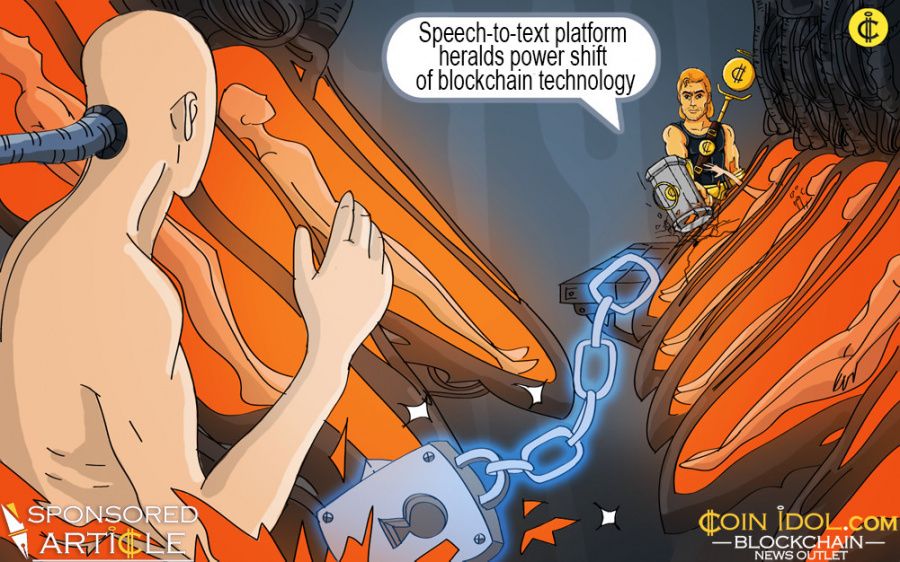Speech-to-Text Platform Heralds Power Shift of Blockchain Technology
Updated: Oct 29, 2017 at 07:14

Anryze, a distributed speech recognition platform, demonstrates the way in which blockchain technology allows grassroots users to become individual providers rather than relying on large companies for service provision.
The tendency of history has been one of increased centralisation. Ever since humans started living together in large numbers, prompted by the development of crop farming and animal husbandry, government and governance have naturally developed in one direction. Concentration of power – political, economic, military, administrative – has been the default state. The direction of travel may periodically be reversed, but such events tend to be unusual, and often sudden and violent: the fall of an empire, the death of a dictator, the collapse of a corporation.
The rise of the internet
New technologies have always provided both opportunities and challenges to the centralisers of the world. Corner a new technology and you have an advantage; let it get away from you and you give up existing control. The current crisis concerning the nuclear capabilities of North Korea illustrate this poignantly, but it has ever been thus. The biblical account records that the Philistines were at pains to prevent the Israelites from getting hold of ironworking equipment and expertise for just this reason (though history will likely remember North Korea and the Israelites in very different terms).
Communications technologies like the internet – or for that matter, the printing press – tend to have a democratising effect, because they enable the spread of information and are hard to suppress and control. Look at the role that the web and social media played in the Arab Spring, and in countless whistleblower cases since. Blockchain, as a peer-to-peer technology, can be seen in the same light. These technologies force a slowdown or a reduction in centralisation. Whilst this has brought about greater transparency in business and politics, the impact has not just been to shine a light on the existing political, financial and corporate powers, but to circumvent them. The growth of the so-called Sharing Economy is the result.
Blockchain business
Bitcoin pioneered this idea, by moving the creation and control over the money supply away from banks and governments and into the hands of the people. (The default tendency towards centralisation quickly made itself known, and bitcoin mining is now the preserve of those who can afford the expensive custom hardware and electricity costs. Nonetheless, it is a global system and many different stakeholders participate, rather than a single Central Bank.)
Blockchain offers the ability to decentralise far more than money – amongst other things the trading of shares and commodities, voting and, intriguingly, the execution of computer code. This brings the possibility of sidestepping not just banks and the traditional financial system, but large corporations, too. As a new generation of companies move their business models to the blockchain, we also see a shift in the nature of their owners and infrastructure partners.
Traditional online businesses require massive data centres and server farms to deal with the load from customers. But when business logic is executed on the blockchain, these become less important. The costs they impose, which have to be passed on to customers, also disappear, and revenues are redistributed to a different category of stakeholder.
Distributed speech recognition
One example of this is Anryze, a blockchain-powered engine for speech-to-text services. In the past, a handful of large companies (amongst them Google and IBM) have cornered this market.
As well as developing its own speech-recognition algorithms, Anryze has created a new business model: one that is fundamentally different from the highly centralised approach of Google and others. Rather than managing all of the resource-heavy processing of audio themselves, in huge data centres, Anryze outsource this to network of participants, who are also connected to the blockchain.
When a business needs to convert an audio file to text, it is submitted to the network, along with per-minute payment in Anryze’s native currency (the RYZ token). The first available node processes the file using Anryze’s software, returns the text and receives the fee. Because this happens on a peer-to-peer basis, there is an efficient market for speech-to-text services, and costs can be as little as a third of those of its competitors.
Brave new economy
The project is funded by selling RYZ tokens, which businesses will need to buy off the market to pay for speech-to-text services. Thus a growing market for speech recognition will lead to greater demand and higher prices. Additionally, whilst the majority of the network fees are paid to ‘miners’ – computers that carry out the processing work of speech recognition – 20% of each payment is distributed among token holders.
Anryze’s distributed approach, like numerous others in the crypto world, demonstrates the shift taking place in the business world due to the adoption of blockchain technologies. Centralised control is giving way towards a model of user-owners – as a business, it makes sense to support and profit from the same services you regularly use. This entails lower barriers to entry, reduced costs and new revenue streams: a new world of economic opportunity for those who grasp the chance early enough.
About the author

Mike Ezhov, co-founder of Anryze - blockchain analyzing service for speech recognition.
Disclaimer. This article is paid and provided by a third-party source and should not be viewed as an endorsement by CoinIdol. Readers should do their own research before investing funds in any company. CoinIdol shall not be responsible or liable, directly or indirectly, for any damage or loss caused or alleged to be caused by or in connection with the use of or reliance on any such content, goods or services mentioned in this article.
News
Price
News
Price

(0 comments)